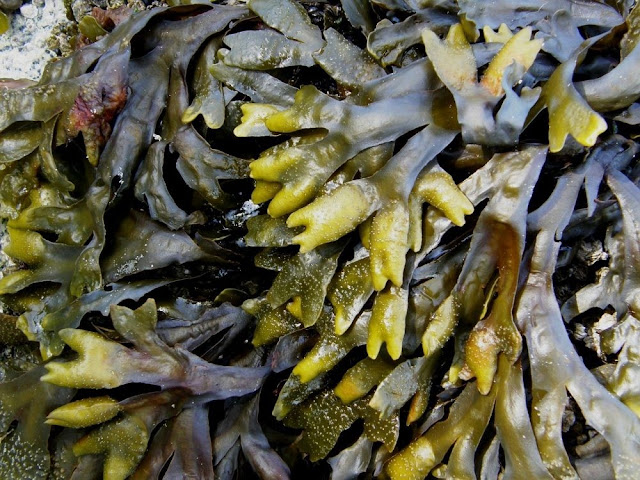GENIALG project – Seaweed biorefineries to manufacture everyday products
Type of post: Project profile.
Asia has a commanding position in supply of seaweed
biomass from aquaculture. In 2015, more than 99% of the production came from this
continent, with China contributing 13,9 Mtons over the total amount of 29,4
Mtons (FAO, 2007). Seaweed (also known
as macroalgae) has long been recognised as a valuable source of diverse
bioactive compounds which has great potential to be used in pharmaceuticals,
nutraceuticals and functional foods. However, until now, seaweed has been
underexploited in Europe due to the challenges of expanding seaweed biomass
production.
Last week, the Biorenewables Development Centre (BDC)
issued a Case
Study about an initiative to boost the European Blue Economy by designing
high-yielding seaweed cultivation systems: GENIALG.
Funded by the European Union’s Horizon 2020 Framework Programme, it is the
first industry-driven project bringing together pioneering companies in
large-scale integrated European biorefineries and experts in seaweed
cultivation, genetics and metabolomics to boost the seaweed industry.
Figure 1. Seaweed (taken from the Case Study issued
by BDC)
Key data
Title
|
GENetic
diversity exploitation for Innovative macro-ALGal biorefinery
|
Programme
/ Instrument
|
H2020-BG-2016-1
/ Innovation Action
|
Total
Budget / EC contribution
|
12,224,237.50
€ / €10,885,817.25 €
|
Duration
|
January
2017 – December 2020 (48 months)
|
Coordinator
|
Centre National de la Recherche Scientifique (CNRS)
|
Partners
|
- ALGAIA
- ALGAplus Produção e Comercialização de Algas e Seus Derivados
Lda
- Amadéite
SAS
- AquaTT UETP CLG
- Biome Technologies plc
- Biorenewables
Development Centre Ltd
- Centro Interdisciplinar de Investigação Marinha e
Ambiental (CIIMAR)
- C-Weed
Aquaculture SARL
- Instituto de Ciência e Inovação em Engenharia Mecânica e
Engenharia Industrial (INEGI)
- IOTA
Pharmaceuticals Ltd
- Lessonia
- National
University of Ireland, Galway
- Seaweed Energy Solutions AS
- SINTEF Ocean
- Stichting
Wageningen Research
- The
Scottish Association for Marine Science (SAMS)
- University
of York
- Universidade
de Aveiro
|
Project objectives
and methodology
GENIALG aims to increase the production and
sustainable exploitation of two high biomass yielding species of European
seaweed:
- The brown alga Saccharina latissima
(also known as sugar kelp).
- The green alga Ulva rigida (often called
sea lettuce).
GENIALG will cover both upstream production and
downstream processing of seaweed for manufacturing new algae-based products for
the market and will increase the social acceptance of this novel seaweed sector:
- Cultivation
Upstream seaweed production where development
of new technologies for germplasm preservation and breeding, cultivation,
harvesting and storage will be demonstrated.
- Biorefinery
Development of new methods for downstream
processing of seaweeds, including pre-treatment, fractionation, extraction,
purification and detailed characterisation of defined chemical compounds and
polymers, as well as fermentation of left-over sugars to added-value products
in a step-by-step manner.
- Social acceptance
Promotion of socio-environmental benefits of
seaweed farming and activities to support/encourage dissemination, stakeholder
engagement, knowledge transfer, outreach and capacity building.
Two pilot
pre-industrial seaweed biorefineries will provide compounds for a wide range of
products such as cosmetics, pharmaceuticals, food and feed ingredients, fine
and specialty chemicals, additives and precursors for biodegradable plastics.
By scaling up the processes, the partnership
will analyse different integrated biomass fractionation process scenarios for
both seaweed species. Product extracts from these processes will then be sent
to industrial partners for application tests.
Expected results
and impact
- By enhancing the supply of high-quality seaweed
biomass, it will be possible to deliver a range of diverse seaweed-derived
chemical compounds for existing and new applications to meet rising market
demand.
- GENIALG will help lead the way in the blue biotechnology
sector in Europe as well as it addresses social acceptability and competition
for maritime space.
- The economic competitiveness of multiple European
industries will be strengthened by supporting new jobs, upskilling, growth and
investment in the blue economy, while ensuring environmental sustainability.





